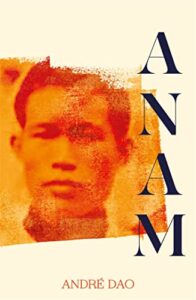ANAM: by André Dao (2017)

Moving from 1930s Hanoi through a series of never-ending wars and displacements to Saigon, Paris, Melbourne and Cambridge, this is a novel about memory and inheritance, colonialism and belonging, home and exile.
Born to a Vietnamese family based in Melbourne, the narrator is haunted by the story of his grandfather whose ten-year imprisonment by the Communist government in Vietnam’s notorious Chi Hoa prison looms large over his own place in the world and his choice to become a human rights lawyer. As he oscillates between identities of his Australian upbringing and his Vietnamese heritage, it is the death of his grandfather in a Parisian suburb and the birth of his daughter that crystallize the strands of thought that have shaped his life.
André Dao’s Anam blends fiction and essay, theory and everyday life to imagine that which has been repressed, left out, and forgotten by archives and by families. As the grandson sifts through letters, photographs, government documents and memories, he has his own family to think about: a partner and an infant daughter. Is there a way to remember the past that creates a future for them as well? Or does coming home always involve a certain amount of forgetting?